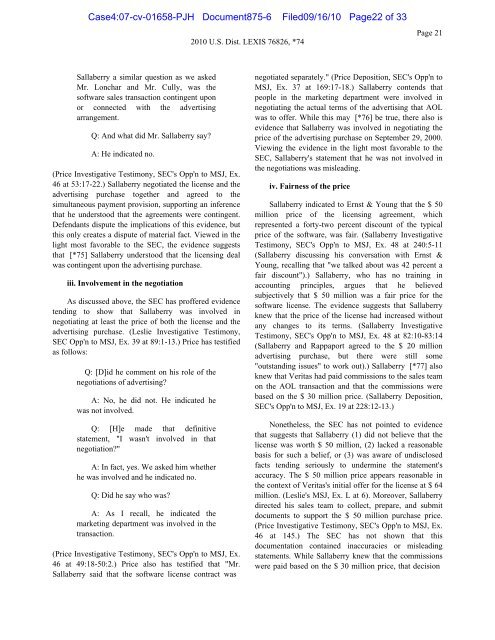exhibit 2 - SAP Lawsuit Portal
exhibit 2 - SAP Lawsuit Portal
exhibit 2 - SAP Lawsuit Portal
Create successful ePaper yourself
Turn your PDF publications into a flip-book with our unique Google optimized e-Paper software.
Case4:07-cv-01658-PJH Document875-6 Filed09/16/10 Page22 of 33<br />
Sallaberry a similar question as we asked<br />
Mr. Lonchar and Mr. Cully, was the<br />
software sales transaction contingent upon<br />
or connected with the advertising<br />
arrangement.<br />
Q: And what did Mr. Sallaberry say?<br />
A: He indicated no.<br />
(Price Investigative Testimony, SEC's Opp'n to MSJ, Ex.<br />
46 at 53:17-22.) Sallaberry negotiated the license and the<br />
advertising purchase together and agreed to the<br />
simultaneous payment provision, supporting an inference<br />
that he understood that the agreements were contingent.<br />
Defendants dispute the implications of this evidence, but<br />
this only creates a dispute of material fact. Viewed in the<br />
light most favorable to the SEC, the evidence suggests<br />
that [*75] Sallaberry understood that the licensing deal<br />
was contingent upon the advertising purchase.<br />
iii. Involvement in the negotiation<br />
As discussed above, the SEC has proffered evidence<br />
tending to show that Sallaberry was involved in<br />
negotiating at least the price of both the license and the<br />
advertising purchase. (Leslie Investigative Testimony,<br />
SEC Opp'n to MSJ, Ex. 39 at 89:1-13.) Price has testified<br />
as follows:<br />
Q: [D]id he comment on his role of the<br />
negotiations of advertising?<br />
A: No, he did not. He indicated he<br />
was not involved.<br />
Q: [H]e made that definitive<br />
statement, "I wasn't involved in that<br />
negotiation?"<br />
A: In fact, yes. We asked him whether<br />
he was involved and he indicated no.<br />
Q: Did he say who was?<br />
A: As I recall, he indicated the<br />
marketing department was involved in the<br />
transaction.<br />
(Price Investigative Testimony, SEC's Opp'n to MSJ, Ex.<br />
46 at 49:18-50:2.) Price also has testified that "Mr.<br />
Sallaberry said that the software license contract was<br />
2010 U.S. Dist. LEXIS 76826, *74<br />
negotiated separately." (Price Deposition, SEC's Opp'n to<br />
MSJ, Ex. 37 at 169:17-18.) Sallaberry contends that<br />
people in the marketing department were involved in<br />
negotiating the actual terms of the advertising that AOL<br />
was to offer. While this may [*76] be true, there also is<br />
evidence that Sallaberry was involved in negotiating the<br />
price of the advertising purchase on September 29, 2000.<br />
Viewing the evidence in the light most favorable to the<br />
SEC, Sallaberry's statement that he was not involved in<br />
the negotiations was misleading.<br />
iv. Fairness of the price<br />
Page 21<br />
Sallaberry indicated to Ernst & Young that the $ 50<br />
million price of the licensing agreement, which<br />
represented a forty-two percent discount of the typical<br />
price of the software, was fair. (Sallaberry Investigative<br />
Testimony, SEC's Opp'n to MSJ, Ex. 48 at 240:5-11<br />
(Sallaberry discussing his conversation with Ernst &<br />
Young, recalling that "we talked about was 42 percent a<br />
fair discount").) Sallaberry, who has no training in<br />
accounting principles, argues that he believed<br />
subjectively that $ 50 million was a fair price for the<br />
software license. The evidence suggests that Sallaberry<br />
knew that the price of the license had increased without<br />
any changes to its terms. (Sallaberry Investigative<br />
Testimony, SEC's Opp'n to MSJ, Ex. 48 at 82:10-83:14<br />
(Sallaberry and Rappaport agreed to the $ 20 million<br />
advertising purchase, but there were still some<br />
"outstanding issues" to work out).) Sallaberry [*77] also<br />
knew that Veritas had paid commissions to the sales team<br />
on the AOL transaction and that the commissions were<br />
based on the $ 30 million price. (Sallaberry Deposition,<br />
SEC's Opp'n to MSJ, Ex. 19 at 228:12-13.)<br />
Nonetheless, the SEC has not pointed to evidence<br />
that suggests that Sallaberry (1) did not believe that the<br />
license was worth $ 50 million, (2) lacked a reasonable<br />
basis for such a belief, or (3) was aware of undisclosed<br />
facts tending seriously to undermine the statement's<br />
accuracy. The $ 50 million price appears reasonable in<br />
the context of Veritas's initial offer for the license at $ 64<br />
million. (Leslie's MSJ, Ex. L at 6). Moreover, Sallaberry<br />
directed his sales team to collect, prepare, and submit<br />
documents to support the $ 50 million purchase price.<br />
(Price Investigative Testimony, SEC's Opp'n to MSJ, Ex.<br />
46 at 145.) The SEC has not shown that this<br />
documentation contained inaccuracies or misleading<br />
statements. While Sallaberry knew that the commissions<br />
were paid based on the $ 30 million price, that decision


